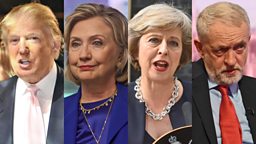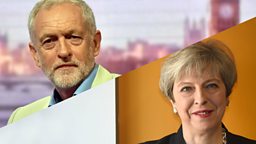Five problems with trying to spot an authentic politician
These days many of us are rather cynical about politicians’ motives and as a result those who come across as true to themselves and their principles can be very appealing. But how can we tell if a politician can be trusted to stick to their promises? The truth is we find it very difficult and pre-existing biases shape how we perceive them. Rosie Campbell, Professor of Politics at Birkbeck University shares some of the reasons why authenticity in the world of politics is often a challenging task.

1. Women politicians often face a double bind that makes it harder for them to appear unscripted
The double bind is a no-win situation where if a woman politician conforms to gender stereotypes and is compassionate and empathetic then she’s "too soft for office" but if she presents a tough, experienced exterior then she’s not a real woman. Hillary Clinton is a good example of a woman politician who has often been described as inauthentic.
2. Opposition politicians have an easier time appearing authentic than those in government
It is easier to judge whether politicians in government act on their promises, or not. Think of Tony Blair in 1997 with no tie and a nice cup of tea – it was harder for him to present himself as a man of the people when he was regularly at international summits with world leaders or at Prime Minister’s Questions being challenged on whether his government was delivering.

3. We’re more likely to think that politicians who share our political preferences are authentic than those from opposing parties
This is especially true in the United States where party identification really polarises voters, but it is also the case in Britain. Our evaluations of politicians are influenced by whether we think they are on the same side as us politically. For example, a YouGov survey conducted in May 2017 found that 28 percent of respondents who intended to vote Conservative chose "honest" as one of three words to describe Theresa May compared with just 1 percent of would-be Labour voters. When it came to Jeremy Corbyn, 55 percent of those intending to vote Labour and just 5 percent of Conservative would-be voters chose "honest" as one of their three words to describe him.
4. Only some politicians can change their minds on major policy promises with their reputations seemingly intact
Compare for example Jeremy Corbyn and Nick Clegg. Corbyn’s positions on Europe, and even nuclear unilateral disarmament, seem to have shifted somewhat, but among his supporters he is nonetheless regarded as authentic. But other politicians have found it much harder to preserve their reputation after changing their minds. "Cleggmania" was very short-lived and Clegg’s career was catastrophically damaged by the decision to support increasing tuition fees, despite having promised not to in the Liberal Democrat manifesto.

5. We’re not very good at telling when politicians have been coached (unless it’s been done badly!)
One way of appearing authentic is to cultivate a deliberately dishevelled look, and politicians who don’t conform to the classic dress code can establish a reputation for authenticity even when they are getting advice to help them manage their image. In fact, the appearance of authenticity is often a well-rehearsed performance. Few of us appear as relaxed when addressing a large crowd as we are when having a conversation down the pub, but being able to do just that is an invaluable skill for an "authentic" politician – even if it’s one that requires much preparation.
-
![]()
Analysis
Examining the ideas and forces that shape public policy. In Authenticity, Professor Rosie Campbell asks how we can make judgments about politicians' authenticity.
More politics from BBC Radio 4
-
![]()
Download Analysis
Examining the ideas and forces which shape public policy.
-
![]()
Political Thinking with Nick Robinson
Nick Robinson talks about what’s really going on in British politics.
-
![]()
Brexit: A Guide for the Perplexed
Chris Morris cuts through the jargon of Brexit.
-
![]()
Meet Nick Robinson
Nick talks about his new Political Thinking podcast.





